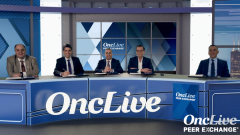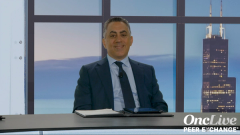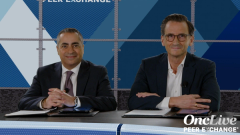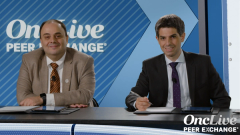
Later-Line IO Therapy for Advanced Hepatocellular Carcinoma
Comprehensive insight on later-line immunotherapy and combination strategies available for patients with advanced hepatocellular carcinoma.
Episodes in this series

Transcript:
Tanios Bekaii-Saab, MD: Let’s move now to this. We hear quite a bit of an interest in exploring the idea of IO [immuno-oncology] or reinitiating IO at some point in therapy. Mark, you’re going to start with this because you mentioned ipi-nivo [ipilimumab/nivolumab], atezo-bev [atezolizumab/bevacizumab], or durva-treme [durvalumab/tremelimumab], but atezo-bev will be the primary driver. Let’s say a patient goes on atezo-bev and does well for about 8 months and then progresses, what’s your second-line [therapy]?
Mark Yarchoan, MD: Some multi–tyrosine kinase inhibitor that offers something beyond just VEGF, hopefully.
Tanios Bekaii-Saab, MD: A third-line patient still doing relatively well, good Child-Pugh score. Would you consider IO-based therapy?
Mark Yarchoan, MD: I would. There’s certainly a role for cabozantinib if they haven’t seen cabozantinib yet because that’s the only agent in our armamentarium that has any third line data and is certainly a correct answer there. There are patients who respond to ipi-nivo who don’t respond to PD-L1 inhibition. My argument for this is the response rate to ipi-nivo from the small studies that are available, Anthony’s study response rate is double what we see with PD-1 or PD-L1 as monotherapy. There are responders to this who don’t respond to single checkpoints. In my experience, I’ve seen complete responses in the third line with ipi-nivo.
Tanios Bekaii-Saab, MD: A patient that was exposed in first-line.
Mark Yarchoan, MD: First-line to atezo-bev.
Tanios Bekaii-Saab, MD: Out of curiosity, how did the patient do with first-line atezo-bev?
Mark Yarchoan, MD: Progression for some of them.
Tanios Bekaii-Saab, MD: Rapid progression or initial response?
Mark Yarchoan, MD: Mix. This is more than one patient. I’ve seen it all. I think there’s a role. There was a time when we had a single drug for HCC [hepatocellular carcinoma], which was sorafenib. This is largely before my time, but some of you were there.
Tanios Bekaii-Saab, MD: We were using Megace [megestrol acetate].
Mark Yarchoan, MD: Many of our patients are not getting the first- and second-line therapy, they’re getting the third, fourth, and fifth line. I have fifth-line patients.
Pierre Gholam, MD: I wouldn’t say many, but some.
Mark Yarchoan, MD: there is a role for dual checkpoint inhibitors and subsequent therapy lines.
Tanios Bekaii-Saab, MD: Pierre, this whole concept of IO post-IO is not unique, at least, in terms of discussion with HCC. We know that in melanoma and small cell, there is some data that suggests you can rechallenge. The data I’ve seen is if you rechallenge it’s mostly in the setting of someone who’s had some solid response in the first line and those that progress or zip through don’t. Is there any biologic rationale for that?
Pierre Gholam, MD: I typically say this well before this point in our conversation to remind everyone that I am not a medical oncologist, so I do not have a perspective on other disease states where people who treat with IO followed by IO. Although, I hear from my colleagues in medical oncology that this is not a common occurrence, this does not happen frequently in cancer treatment. The idea that someone would have a relatively poor response to IO, either as monotherapy or in combination, and then successfully navigate treatment with second-line, albeit a different agent or a different target, I find that to be biologically implausible. We learned that at ASCO [American Society of Clinical Oncology] about new targets that are being looked at CAR [chimeric antigen receptor] T cells and other things, perhaps there is more to the story of immune-mediated cancer therapy than what we know so far. I certainly hope so, but at the current time, this seems to be a relatively unattractive option for me.
Tanios Bekaii-Saab, MD: Outside of a clinical trial.
Pierre Gholam, MD: For sure.
Tanios Bekaii-Saab, MD: Anthony, the strategies that are being explored are post-atezo-bev, mostly thinking about PD- 1–positive, CTLA-4, or PD-L1–positive TKI [tyrosine kinase inhibitors]. Again, same question to you, what is that rationale? Where is that rationale coming from?
Anthony El-Khoueiry, MD: Similar to what we do with nonimmunotherapies, we’re trying to target either the tumor cell or the microenvironment from different angles. Bringing in a CTLA-4 primes those T cells in the periphery, expands a subset of T cells that are different than the T cells that anti–-PD-1 therapy works on, which are in the tumor microenvironment already there. PD1 therapy alone does not recruit T cells to the environment, it works on CD8-postive T-cells. There are complimentary actions of these agents that may offer some rationale, but we also unfortunately, do a lot of empiric things in clinical trials based on hypothetical or observations. I think it’s fair to explore this. The strong ipi-nivo data of 30% response rate is post-sorafenib; post atezo-bev it’s largely anecdote, there is at least 1 small study that I’ve seen. You’ve told me about a second one. The response rate post-IO with ipi-nivo is lower, it’s 10% to 20%. How durable these responses are going to be, we don’t know. I think we use it with caution in the right patient.
Tanios Bekaii-Saab, MD: Preferably on a clinical trial ultimately, but the signals are there, it’s worth exploring and perhaps think about the biology like other settings have. Do you have a nice response to start with the first line? Will we see differences in the second-line, to Pierre’s point, biologically? If it didn’t work the first time, is it going to work the second time at the end of the day? That makes quite a bit of sense. You can change the coins there.
Transcript edited for clarity.








































